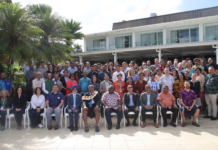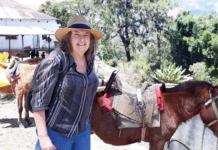
By Sri Krishnamurthi, contributing editor of Pacific Media Watch
Homegrown Australian television shows to the tune of $17.1 million will be broadcast in the Pacific in a bid believed intended to stymie China’s diplomatic and media rise in the region.
Shows such as The Voice, Border Security, Neighbours and are to be offered as the main fare to people who barely understand Australian culture, although Border Security could cause some animosity to those Pacific people who are denied entry into Australia.
However, some of those critical of the move say the funds could have been better used to develop Pacific broadcasting capabilities, strengthen independent journalism in the region or showcase content more relevant to Pacific audiences.
READ MORE: ‘Neighbours is irrelevant to most Pacific Islanders’
At the 2018 Pacific Islands Forum (PIF) meeting in Nauru, New Zealand’s Deputy Prime Minister and Foreign Minister Winston Peters announced that New Zealand would spend $10 million on a Pasifika channel for the region over the next three years.
He said at the time that the plan would improve both the production of more Pacific content, including news and current affairs.
“The expansion of the Pasifika TV service will dramatically improve the way in which New Zealand content is delivered across the Pacific,” Peters said at the time.
“While the existing service has demonstrated its ability to lift broadcasting and journalism in the region, it is the natural next step to promote the production of more Pacific content, including news and current affairs.”
Australian contrast with NZ approach
In contrast, Australia intends broadcast hours of Australian-made content and bombard the Pacific Islands in a bid to combat China’s charm offensive in the Pacific.
Minister for International Development and the Pacific Alex Hawke said the “PacificAus TV initiative is a terrific demonstration of shared cultural ties and links between Australia and the Pacific”, while Australia’s Foreign Minister, Senator Marise Payne, said: “Having the opportunity to watch the same stories on our screens will only deepen the connection with our Pacific family,” as ABC reported.
However, Jemima Garrett, co-convenor of the Australia Asia Pacific Media Initiative and a former Pacific correspondent for the ABC, said the initiative was a welcome recognition that Australia should have a broadcasting voice in the Pacific, but it needed additional programmes to be fit for purpose.
“Australia needs to talk ‘with’ not ‘to’ our region and include the rich diversity of Australian voices and voices from the region,” Garrett said.
“Watching rich, white people renovate their homes will not ‘deepen the connection’ with the Pacific or overcome perceptions that Australia can be paternalistic. Nor will providing Border Security in a region in which visa access is a sore point.
“If the PacificAus TV initiative is about building relationships, then co-productions made by Australian and Pacific media companies working together are the way to go.
“Currently the initiative does not provide for the involvement of Australia’s Pacific communities or for the involvement of the ABC, SBS or National Indigenous Television or independent producers with an interest in the region,” she said.
‘Lukewarm’ reaction in Fiji
Meanwhile, Shailendra Singh, head of the journalism programme at the University of South Pacific in Fiji, said the reaction to the news in Fiji had been “lukewarm”.
“Money certainly would have been put to better use developing local content,” he said.
“Even if the strategy meets Australia’s geopolitical needs, does it meet the needs of Pacific Islanders? Is Australia putting its needs ahead of the Pacific? These are some of the questions that people are asking,” he said.
“There is already some grumbling about cultural imperialism through media. This on top of long held concerns about the ratio of local versus foreign content.
“Some feel media is already too commercialised. There is already too much sports and entertainment in comparison to news. In Fiji Rugby sevens had been called the opium of the people because of slavish coverage,” he said.
“So even if the strategy meets Australia’s geopolitical needs, does it meet the needs of Pacific Islanders? Is Australia putting its needs ahead of the Pacific?” he asked.
“Money certainly would have been put to better use developing local content. In developing local content one can also develop local journalists and journalism. The benefits are both visible and tangible.
‘Great local analysis’
“Some great analysis written by local journalists have been published. Why was this working model bypassed?” he asked.
“Soft power move? That seems the obvious explanation. What is the gain for Australia in getting Pacific populations hooked on Neighbours?
“It is a bit baffling but no doubt the Australian government has thought over this carefully before unleashing this grand plan on us.
“It is not clear how the Chinese feel about it. They have reserved comment so far,” the academic said.
Dan McGarry, the former media director at the Vanuatu Daily Post newspaper, wrote that the announcement seemed “silly, seen from here”.
“Pacific islanders want news, they want weather updates, especially during cyclone season. But language and cultural differences make shows like Neighbours irrelevant to most islanders. Entertainment wasn’t what we asked for (except for The Voice – everyone loves that).”
The question is whether Australia was trying to curry favour as China is seen to be pandering to the Pacific media.
China regularly pays for Pacific journalists to visit China on see-for-themselves excursions as evidenced by nearly a dozen journalists from print media organisations in the Pacific going on a 10-day tour in Beijing in mid-2016.













































To expand on your comment regarding adverse weather events I read with horror recently the senior Nadi weather forecasters prediction several days before Hurricane Harold was due to arrive that it was not going to whack Fiji.
I know as the weather forecaster should know that hurricanes are unpredictable beasts. A degree or two deviation many days before arrival can mean hundreds of kilometers either way several days later.
Ask the residents of Kadavu Vatulelele and Lau Group their impressions of this sort of irresponsible forecasting.
Comments are closed.